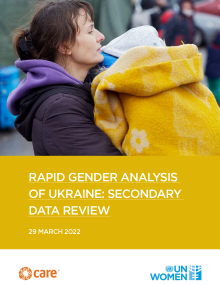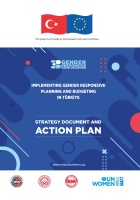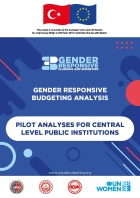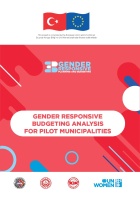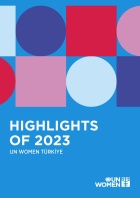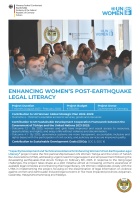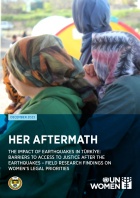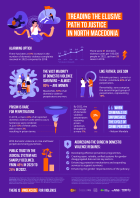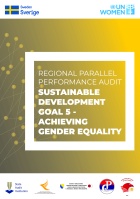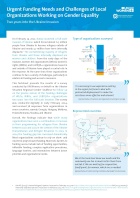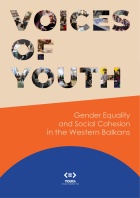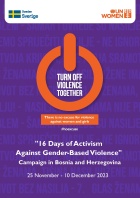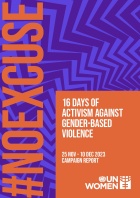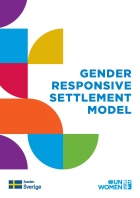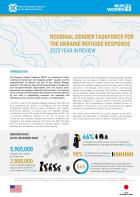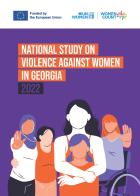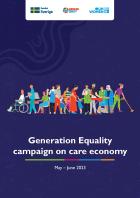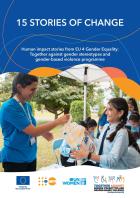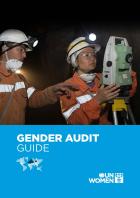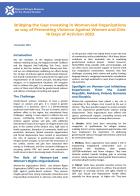Implementing Gender-Responsive Planning and Budgeting in Türkiye - Strategy Document and Action Plan
Date:
Gender Responsive Budgeting Strategy Document and Action Plan aims empowering women and achieving gender equality in Türkiye through the systematic and sustainable integration of gender equality perspective into the national and local policy making, planning, and budgeting processes.
Date:
This booklet shares insights into the gender-responsive budgeting analyses that were conducted in selected central level public institutions within the scope of the Implementation of Gender Responsive Planning and Budgeting in Turkey Project.
Date:
This booklet shares insights into the gender-responsive budgeting analyses that were conducted in selected pilot municipalities within the scope of the Implementation of Gender Responsive Planning and Budgeting in Turkey Project.
Date:
2023 posed significant challenges due to the earthquakes on February 6, causing widespread destruction and loss of life in 11 provinces. The Highlights 2023 report narrates UN Women Türkiye's journey throughout the year, showcasing its work and main results achieved under its programmes and campaigns.
Date:
The brief on the "Enhancing Women's Post-Earthquake Legal Literacy" provides information about the project which marks the first partnership between UN Women Türkiye and the Union of Turkish Bar Associations (UTBA), addressing urgent need for legal support and empowerment following the devastating earthquakes that struck Türkiye on February 6th, 2023.
Date:
The infographic sheds light on the impact of childcare responsibilities on women’s labour force participation in North Macedonia based on a detailed analysis and visualization of data from official statistics and publicly available research. The product presents solutions such as investing in daycare, involving fathers, promoting flexible work arrangements, and introducing paid parental leave to support working mothers and foster a family-friendly economy.
Date:
The third issue of the "Her Aftermath - The Impact of the Earthquakes in Türkiye" series focuses on the most pressing issues women face to exercise their rights and legal needs in the aftermath of the earthquakes that took place in February 2023 in Türkiye. The report summarizes the main findings of the research and provides recommendations for further work which can be conducted during the recovery process on women’s access to justice.
Date:
The infographic unveils the stark realities of domestic violence and access to justice in North Macedonia through a comprehensive data analysis and visualization. A dedicated team of government officials and civil society activists meticulously delved into official statistics, publicly available research and open sources to deep dive into this specific issue. This eye-opening product will serve as an advocacy tool to champion effective policies and programmes that ensure the safety of all women and girls within their homes.
Date:
Regional parallel performance audit in the field of gender equality implemented by the State Audit Institution of the Republic of Serbia, State Audit Institution of Montenegro, Audit Office of the Institutions of Bosnia and Herzegovina, Audit Office of the Institutions in the Federation of Bosnia and Herzegovina and the Supreme Audit Office of the Republika Srpska Public Sector.
Date:
Althouth WLOs, WROs, and LGBTQIA+ organizations have been central in the humanitarian response to the Russian full-scale invasion of Ukraine, two years into the invasion they continue to face challenges accessing funding and resources. This factsheet presents the results of a survey conducted by the UN Women Regional Office for Europe and Central Asia to investigate the funding challenges faced by these organizations two years into the full-scale invasion.
Date:
This regional research, implemented by UN Women and co-designed, conducted and developed by five young researchers from Albania, Bosnia and Herzegovina, Kosovo1, North Macedonia, and Serbia aims to explore the linkages between youth development, gender equality, and social cohesion challenges in the region. The insights gained from the research provide valuable information on how youth from across the region would like to see gender equality and social cohesion challenges tackled.
Date:
The campaign "16 Days of Activism Against
Gender-Based Violence" is marked annually from 25 November to 10 December. It is part of the broader UNiTE campaign, which calls on governments, media, women's rights organizations, youth, civil society, and the entire UN to fight violence against women and girls. This year's campaign was implemented with the support of Sweden, and in collaboration with numerous partners, government representatives, CSOs, artists, and influencers.
Date:
UN Women's #NoExcuse Campaign, conducted within 16 Days of Activism in 2023, drew attention to the importance of protective legal frameworks and called for the effective implementation of laws to prevent violence against women. The report reflects on the outcomes of the campaign and the support it received from partners and private sector.
Date:
This model serves as a guide to consider the differentiated needs and priorities of women and girls when establishing new temporary and permanent settlements during the resumption of basic services in disaster and crisis-affected areas.
Date:
The Regional Gender Taskforce (RGTF) is a network of actors working to mainstream and integrate gender equality and the empowerment of women and girls in the Ukraine Refugee Response. This annual review identifies the results attained by the RGTF, showcases the initiatives of individual members, and considers how to best continue the work of the RGTF moving forward.
Date:
The National Study on Violence against Women in Georgia 2022 — the second nationwide survey conducted by the National Statistics Office of Georgia and UN Women — found that 50.1 per cent of women aged 15–69 in Georgia have experienced at least one form of violence in their lifetime. The study provides policy makers, nongovernmental organizations and other stakeholders with data for evidence-based policies and programmes to achieve gender equality and end violence against women.
Date:
Generation Equality campaign on care economy was implemented from May to June 2023 with a focus on the care economy and the economic
empowerment of women. The campaign was implemented through various activities with the aim of increasing the understanding of BiH citizens about the care economy and paid and unpaid work. The slogan of the campaign was the sentence „Nemam ti kad" ("I don't have time").
Date:
Discover the transformative impact of the EU 4 Gender Equality regional programme in Armenia, Azerbaijan, Belarus, Georgia, Moldova, and Ukraine. Three-year initiative challenges gender stereotypes, strengthens equal rights, and enhances opportunities for women and men. Unveil the inspiring stories of 15 individuals—women, men, boys, and girls—who have become advocates for gender equality, their lives enriched through newfound knowledge and experiences.
Date:
This guide is designed to equip auditors with essential tools and insights, empowering them to integrate gender considerations seamlessly into their auditing processes.
Date:
Joint Statement "Bridging the Gap: Investing in Women led Organizations as way of Preventing Violence Against Women and Girls- 16 Days of Activism 2023"
